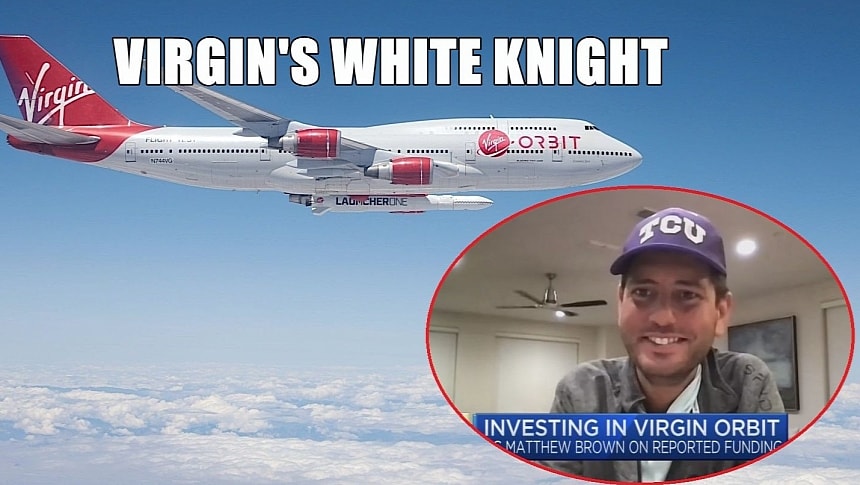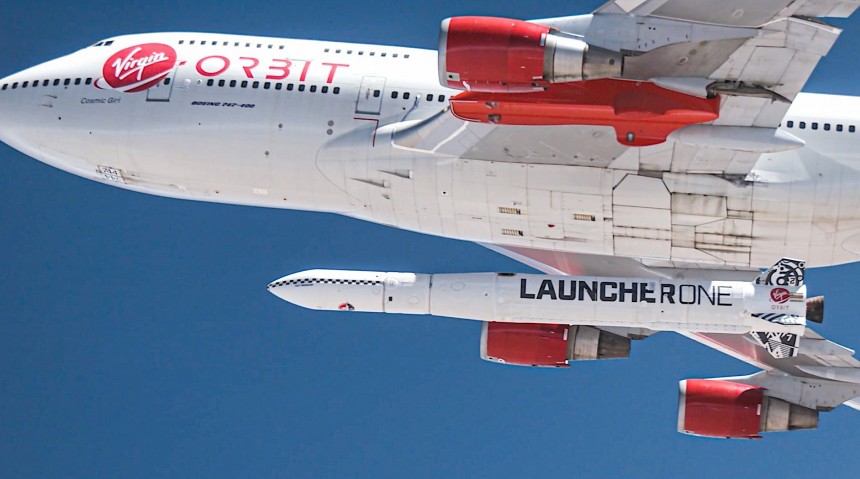In March 2023, after a failed satellite launch mission two months prior and repeated setbacks in securing financing to keep up with the very high burn rate, Virgin Orbit, the Virgin Galactic offshoot that offered satellite delivery solutions, shuttered. The bankruptcy filing came after an even more troubled week in which the company's apparent White Knight turned out to be a Dark Prince with alleged evil intentions.
If that's too much of a fairy-tale comparison for you, here's to hoping you like your space exploration stories with a heavy helping of movie-like drama. The closed chapter of Virgin Orbit, once valued at $3.7 billion and considered a pioneer in the democratization of space exploration, is closed for good for Virgin but not so much for this infamous White Knight.
His name is Matthew Brown, a self-described "venture capitalist" with a portfolio including over $750 million in personal capital invested and at least another $200 million to spare to render Virgin Orbit cash flow positive again. He emerged out of nowhere in March 2023 with an offer for Virgin Orbit that would have "basically made [him] the owner" of the company, before talks fell through.
Now, the SEC (Securities Exchange Commission) has formally charged him with fraud for making a "bogus" offer of investment into the struggling company and deliberately misleading or withholding information during negotiations. Put simply, the man who boasted about being in a position to invest $200 million of his own cash into Virgin Orbit had less than one buck to his name in his bank account.
But for Virgin Orbit, the January 2023 failed mission marked the end of the road. Though the company, which had kicked off in 2017, was deemed as having a competitive edge due to its different approach to launching rockets into space (the horizontal approach, using a modified Boeing 747), it was burning through cash faster than it could secure investments.
In early March 2023, the company had already filed with the SEC a notice of intent to stall operations in preparation for a potential bankruptcy filing. Then Brown came along, like a white knight savior riding on a white horse laden with $200 million in cash.
Word that a Texas-based investor by the name Matthew Brown was looking to invest in Virgin Orbit and thus take control over the company leaked on Wikipedia, out of all places. It was immediately picked up by established media, even though no one seemed to know where this investor had come from.
The next day, despite having signed an NDA (non-disclosure agreement) with Virgin, Brown was live on CNBC, introducing himself as a space enthusiast with investments in over 13 space companies and a firm belief that Virgin was worthy of his attention – and of his money, which was more important. He had no plans to fly on Virgin rockets like Virgin boss Sir Richard Branson had done, but he did have cash to hand around.
Brown wouldn't confirm the $200 million figure thrown around, but he didn't deny it, either. But he did say that he expected the deal to be finalized within the next 24 hours, adding that it would make him "basically the owner" of Virgin Orbit once the ink dried on the dotted line. Several op-eds followed, branding him Virgin's white knight who, with his own cash, would keep the company in operation for at least another year.
The negotiations fell through within hours after that. Virgin Orbit eventually sent a cease-and-desist letter to Brown to stop him from talking to the media about the negotiations, and filed for bankruptcy the next day.
Put in very simple words, the man who went on national television to say he had $200 million at the ready to save Virgin had less than one buck to his name. He never finished college, had never worked in investment, and had no experience either in investing on such a scale or space startups – according to the formal SEC complaint, which you can find in full below.
His fraudulent scheme involved him leaking his potential interest in Virgin to artificially inflate stock price, and then conduct negotiations on deliberate lies or failure to disclose information, as per the same.
Brown also tried to leverage the media interest he seems to have generated himself by trying to force Virgin into agreeing to a "breakup fee" of 3%, payable if the deal fell through, before allowing the company to do due diligence. To get Virgin to even talk to him, he used a fake screenshot showing a balance of over $182 million in his company's account.
Questions about this mysterious investor who boasted connections to Mark Zuckerberg and the Winklevoss twins, who claimed to be an early SpaceX shareholder, and having advised the Obama White House and famed investor T. Boone Pickens on renewables, had been brought up long before the SEC complaint. Brown himself laughed them off on the socials as factual inaccuracies brought up for the entertainment factor, but he never took the time to address any one of them in particular.
There's no laughing off the SEC complaint now. The SEC is requesting a trial by jury and is seeking a civil fine and a permanent ban for Brown on purchasing or selling securities.
His name is Matthew Brown, a self-described "venture capitalist" with a portfolio including over $750 million in personal capital invested and at least another $200 million to spare to render Virgin Orbit cash flow positive again. He emerged out of nowhere in March 2023 with an offer for Virgin Orbit that would have "basically made [him] the owner" of the company, before talks fell through.
Now, the SEC (Securities Exchange Commission) has formally charged him with fraud for making a "bogus" offer of investment into the struggling company and deliberately misleading or withholding information during negotiations. Put simply, the man who boasted about being in a position to invest $200 million of his own cash into Virgin Orbit had less than one buck to his name in his bank account.
Virgin Orbit goes under. Brown to the rescue!
Space exploration and especially space tourism, the more recent branch of "traditional" exploration, are no strangers to failed missions. You need to look no further than SpaceX for an abundance of examples: this is an emerging industry where even a rocket exploding mid-air is a relative "success" because it's a lesson learned.But for Virgin Orbit, the January 2023 failed mission marked the end of the road. Though the company, which had kicked off in 2017, was deemed as having a competitive edge due to its different approach to launching rockets into space (the horizontal approach, using a modified Boeing 747), it was burning through cash faster than it could secure investments.
In early March 2023, the company had already filed with the SEC a notice of intent to stall operations in preparation for a potential bankruptcy filing. Then Brown came along, like a white knight savior riding on a white horse laden with $200 million in cash.
The next day, despite having signed an NDA (non-disclosure agreement) with Virgin, Brown was live on CNBC, introducing himself as a space enthusiast with investments in over 13 space companies and a firm belief that Virgin was worthy of his attention – and of his money, which was more important. He had no plans to fly on Virgin rockets like Virgin boss Sir Richard Branson had done, but he did have cash to hand around.
Brown wouldn't confirm the $200 million figure thrown around, but he didn't deny it, either. But he did say that he expected the deal to be finalized within the next 24 hours, adding that it would make him "basically the owner" of Virgin Orbit once the ink dried on the dotted line. Several op-eds followed, branding him Virgin's white knight who, with his own cash, would keep the company in operation for at least another year.
The SEC alleges "fraudulent scheme"
According to the SEC, Brown lied in just about every aspect that matters in his negotiations with Virgin, from his having a law degree from the Southern Methodist University, to his involvement in other space companies, his investment portfolio, his experience, or the cash available in his company's bank account.Put in very simple words, the man who went on national television to say he had $200 million at the ready to save Virgin had less than one buck to his name. He never finished college, had never worked in investment, and had no experience either in investing on such a scale or space startups – according to the formal SEC complaint, which you can find in full below.
His fraudulent scheme involved him leaking his potential interest in Virgin to artificially inflate stock price, and then conduct negotiations on deliberate lies or failure to disclose information, as per the same.
Questions about this mysterious investor who boasted connections to Mark Zuckerberg and the Winklevoss twins, who claimed to be an early SpaceX shareholder, and having advised the Obama White House and famed investor T. Boone Pickens on renewables, had been brought up long before the SEC complaint. Brown himself laughed them off on the socials as factual inaccuracies brought up for the entertainment factor, but he never took the time to address any one of them in particular.
There's no laughing off the SEC complaint now. The SEC is requesting a trial by jury and is seeking a civil fine and a permanent ban for Brown on purchasing or selling securities.
Brown claimed he worked for T. Boone Pickens, but Pickens' long-time advisers didn't know him. Brown claimed to manage multiple multi-billion dollar investment vehicles, but evidence of deals was few and far between.
— Tim Fernholz (@TimFernholz) March 31, 2023


































